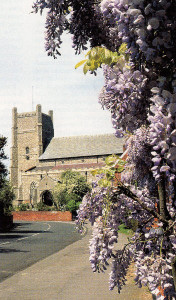
Lingering with my faithful tricycle in the village square, waiting for the bus to arrive from Woodbridge, my father was to visit us from war-torn London where he was serving in the fire brigade. I was ready to take him to my grandparent’s cottage where my mother and I were staying to get away from the bombing.
This was one of the first retained memories I have of the lovely village of Orford on the Suffolk coast. Needless to say as a four-year-old, I did not recognise my father when he arrived, such are the vagaries of war-time when families are split up. But at least I had a father to visit us. As I grew up, I came to realise many were not so lucky.
Although quiet, there was quite a lot going on in and around the village. On many nights my Grandmother would wake me and we would sit on the front door step to watch ‘doodlebugs’ being shot at by pursuing fighters.
There was always a bit of excitement when a lorry passed through carrying the remains of a shot-down German plane. This was taken across to Orfordness, known as ‘the Island’, where it was put back together and studied by the boffins. Although the Island was the domain of the RAF and therefore out of bounds to most people, grandfather Dan was one of the security policemen and so occasionally I was allowed to go over on the launch with him to see the planes and even sometimes climb aboard one.
Towards the end of the war and afterwards, I often scrounged a ride across the river and back in the fast RAF launch. I must have been about nine when I was allowed to take the launch over on my own to ferry some passengers across the river.
The long holidays, especially in the summer, were wonderful times for children. There was so much to do. Many are the days that I spent mucking about on the river, helping ‘Uncle’ George Brinkley, the harbourmaster. We would row out to moored yachts to pump out the bilges.
While poking about in the mud near the dinghy hard, I found a clip of ammunition which had probably fallen from a plane. Warned like all children not to touch this type of thing, I carefully tied a piece of string to it and dragged it up the road to show my grandparents! I don’t know how hot these bullets became by being dragged for about half a mile, but certainly not as hot as my behind from the tanning I received!
On other days us youngsters would roam for miles across the fields or through the pine forests, quite often bringing home a pile of branches from the woods on our home made ‘soap boxes’ to keep the kitchen range going. The sound of this range being blackleaded by grandmother very early each morning was usually the first thing heard.
Some days were spent out ‘rabbiting’ in the fields, especially at harvest time, and there were few days when I didn’t proudly present my Nan with a rabbit for the pot, part of the staple diet.
Harvest time was a lot of fun. With heavy horses still being used for some tasks, I was allowed to ride ‘Jim’, a very friendly Suffolk punch, whilst collecting cartloads of corn.
After the war we moved back to London, but the school summer holidays were always eagerly awaited so that I could get back to Orford. -Mike Sampson








